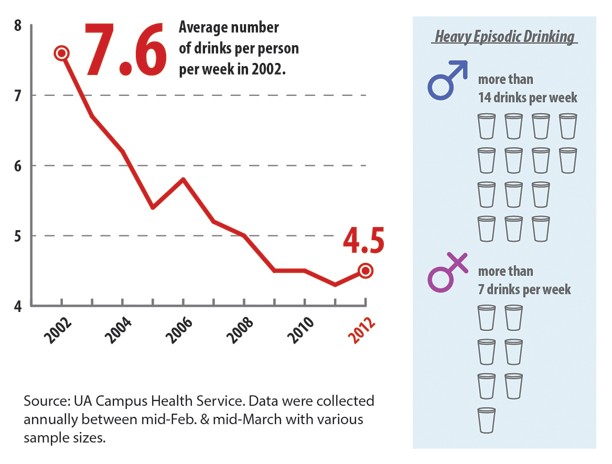Although the UA student population reached an all-time high last semester, alcohol consumption rates have decreased significantly.
Results from the Annual Health and Wellness survey conducted by Campus Health Service in 2012 suggest that on average, students are drinking less. The survey has been distributed to a random selection of students between February and March every year since 1992, according to David Salafsky, director of Health Promotion and Preventive Services at Campus Health Service. Last year’s survey reached more than 2,000 students.
Students seem to be getting smarter about their drinking, Salafsky said.
The average number of alcoholic drinks consumed per week has significantly decreased, from 7.6 drinks in 2002 to 4.5 drinks in 2012, according to survey results. The amount of frequent heavy episodic drinking —five or more drinks in one sitting, six or more times in the past two weeks — has decreased from 13.5 in 2002 to 6.1 in 2012. Results also showed an increase in the number of students who have not drunk alcohol in the past 30 days and students who set a limit on the number of drinks they will have.
One factor that could have contributed to the decrease is the growing number of alcohol education programs. HPPS offers several programs for alcohol education, including Student Health Alcohol Drug Education and Brief Alcohol Screening and Intervention for College Students.
But recently, CHS has worked to promote alcohol awareness with a less traditional approach. In 2010, Spencer Gorin, health educator for HPPS, developed and began facilitating a new program called the Buzz. Since then, Gorin has been visiting residence halls and greek houses to give presentations on alcohol consumption. The feedback for the program has been great, Salafsky said.
The program’s success can be largely attributed to the unconventional approach Gorin takes through interactive learning, games and dialogue.
“As you can imagine, alcohol education presentations is a pretty hard sell to college students, and the traditional ways of doing it, through lectures and social norming, weren’t exciting students,” Gorin said. “I believe anyone that’s been lectured at for six or seven hours a day, the last thing they want to listen to is another lecture, especially on alcohol.”
Gorin, who has 25 years of experience teaching students through play, says that play is the most natural way for people to learn. He describes the Buzz as a “fun, game-oriented, interactive experience.”
“One part of the evaluation is changing an intent to drink,” Gorin said. Based on 21 presentations last year, 42 percent of moderate drinkers reported that after attending a Buzz presentation, they intended to drink less, and 80 percent of heavy drinkers said that after attending the presentation, they intended to change their drinking, according to Gorin.
A heavy drinker is a man who consumes more than 14 drinks per week or a woman who consumes more than seven, as defined by the National Institute on Alcohol Abuse and Alcoholism, Gorin said.
“We’re really reaching them [students] on much higher numbers than ever before, and I think it’s because of the format style,” Gorin said.
Rebecca Archer, a speech-language pathology graduate student and former president of Alpha Phi Omega, a community service fraternity was required to take the Buzz as part of her resident assistant training for Maricopa Residence Hall. Archer said that she enjoyed the program so much, she decided to introduce it to Alpha Phi Omega.
“I certainly learned a lot,” Archer said.
For students who choose to drink, Salafsky advises that they make sure they have a designated driver, set a limit on the number of drinks they will consume in one night and eat something before going out.
“My basic message is, if you are going to choose to do alcohol, make sure you do the alcohol and the alcohol doesn’t do you,” Gorin said.









